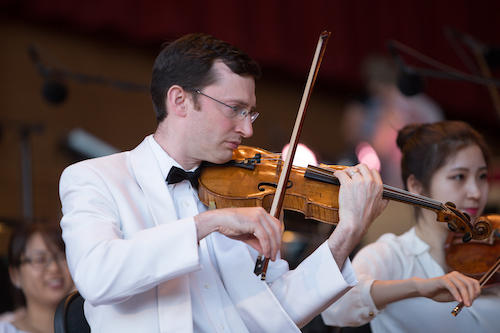Grant Park musicians downsize for folk-flavored program in South Shore

Many of the most memorable Grant Park Orchestra concerts feature unjustly neglected repertoire served up before thousands under the night sky, led by conductor Carlos Kalmar.
The Grant Park Music Festival’s satellite concert Monday night offered an utterly different experience, featuring a trimmed program of classical favorites with a reduced chamber orchestra, sans maestro, under the Mediterranean Revival roof of the intimate South Shore Cultural Center.
The performances of the three works were tidy and convincing, if a bit safe at times. On a few occasions, one couldn’t help feeling that some podium direction would have contributed more secure balances and ensemble.
Bach’s concertos were likely intended for performance without a conductor, and concertmaster Jeremy Black’s superb playing and leadership of the ensemble left nothing to be desired in the Concerto for Oboe and Violin in C minor.
Black and oboist Anne Bach were perfectly synchronized and stylishly elegant in a brisk reading of the opening Allegro. Their passagework was polished and exacting, seamlessly integrating with the small string ensemble and harpsichordist Stephen Alltop. While forward momentum was the clear priority, Black allowed for the occasional slight pullback in tempo at essential road markers.
The soloists chose a sensibly moderate tempo for the Adagio, and their lyrical playing evoked a tender, operatic duo. Their shapely rendering was more than enough to compensate for accompanying pizzicato balances that skewed heavier toward the lower strings. The finale brought a return to the ebullience of the opening movement, with violin pyrotechnics tossed off by Black with nary a hitch.
Gustav Holst’s principal employer for much of his career was the St. Paul’s Girl’s School in west London, where he was appointed director of music early in the 20th century. The first piece he composed in his new post was the compact confection St. Paul’s Suite for strings, a work intended for and most often performed today by student ensembles.
It wouldn’t be an English suite without a Jig, and Black led the opening movement in a sleek performance that nevertheless needed more idiomatic swagger and bite. The outer sections of the second movement evoked a tasteful parlor waltz accompanied by lacy, demure ostinatos in the appropriately bashful second violins.
The solo lines of Black and violist Yoshihiko Nakano in the “Intermezzo” were lovingly sculpted after some misaligned pizzicatos in the opening tutti. Black was able to elicit more vigor from his forces in his urgent account of the finale, a mash-up of the English folk-tunes “Dargason” and “Greensleeves.”
The folk motif continued in a loving account of that most favored bit of Americana, Aaron Copland’s Appalachian Spring, in the original chamber version for 13 instruments. Conceived as a ballet for Martha Graham, the composer was obliged to reduce the scoring to fit the musicians in a small space at the Library of Congress for the premiere.
The opening slow section introduces the characters bathed in simple, nostalgia-tinged lyricism. Bassoonist Eric Hall, flutist Jennifer Lawson, and clarinetist Dario Brignoli depicted the scene with warm, hushed hues. The burst of lively arpeggios in the strings was tightly realized, with nary a stumble even with Copland’s craggy, irregular meters. Brignoli was once again a standout in the passionate duo of the contented newlyweds. The next section, with its invocation of square dancing and country fiddling, was rhythmically rigorous if a bit prim.
Just as Holst dusted off a couple of famous tunes to close off St. Paul’s Suite, Copland composed five variations on “Simple Gifts” near the end of his ballet, all the better to leave the audience humming on their way to the exits. The three principal winds once again excelled, and pianist Andrea Swan punctuated their singing lines with brisk, scalar embellishments. Hushed, muted strings brought the memorable performance to a meditative conclusion.
The program will be repeated 7 p.m. Thursday in the Columbus Park Refectory. gpmf.org
Posted in Uncategorized


